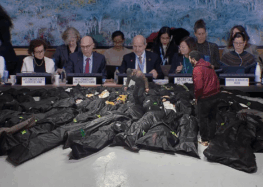Political Prisoners at Evin Transferred into Quarantine without Explanation

Atieh Taheri, the wife of Saeed Matinpour, who is an Azeri journalist and civil activist and one of the prisoners transferred into quarantine
Twenty-seven political prisoners have been transferred from Evin Prison’s Ward 350 to quarantine, where they are now being held in conditions tantamount to clear and serious ill treatment.
In an interview with the International Campaign for Human Rights in Iran, Atieh Taheri, the wife of Saeed Matinpour, who is an Azeri journalist and civil activist and one of the prisoners transferred into quarantine, reported that Matinpour believes the transfer will last for some time. In a brief phone conversation with his wife, Matinpour said no reason had been given for the sudden transfer of prisoners from this ward.
Taheri told the Campaign that Matinpour described the quarantine ward as having four windowless cells and a narrow courtyard for fresh air. “As you can imagine from its name, the quarantine is a temporary holding place for detainees when they first enter prison. But Saeed and others have to live there,” Taheri said.
“I don’t know what’s happened exactly but apparently the legal representative for Ward 7 complained that the transfer of 50 prisoners from Ward 350 to Ward 7 had caused overcrowding and the authorities did not have room in other sections, so they sent 27 prisoners to the quarantine,” Taheri added.
Iranian judicial and prison authorities have not commented on the sudden transfers. There is speculation that following last April’s clashes at Evin’s Ward 350, when prisoners were attacked by security guards, a decision was made to break up the group of prisoners who were inside Ward 350 at the time of the incident.
Matinpour has spent six years in prison and suffers from serious stomach ailments. His conditions may now worsen in quarantine [where the food is consistently of substandard quality], his wife told the Campaign.
On August 2, Kalame, a news site close to Mir Hossein Mousavi, the opposition leader who has been held under house arrest for over three years, reported the sudden transfer of 50 prisoners from Ward 350 to other sections of Evin Prison, leaving 63 others. The news site predicted that the transfers from this ward, reserved for political prisoners since the 1979 revolution, would continue.
“Being returned to quarantine is hard on prisoners who have been in prison for a long time. It’s added torture and a repeat of the hardships of the first days of imprisonment,” Taheri told the Campaign.
Asked why the prisoners had been transferred to quarantine, Taheri said, “They have not given an explanation to us or the prisoners. They do not even acknowledge political prisoners and their families, let alone answer their questions. We don’t know what’s going on and when something happens we find out about it from web sites.”
Matinpour, 39, studied philosophy at Tehran University and wrote for the Zanjan Weekly. He was active in human rights and ethnic minority rights causes and was arrested on May 25, 2007, for participating in a seminar in defense of Azeri civil rights in Turkey. He was sentenced to eight years in prison by Branch 15 of the Revolutionary Court of Tehran, presided over by Judge Salavati, on charges of “contact with foreigners,” and “propaganda against the state.”






